
Elmore Yocum Sarles was an American politician who was the ninth governor of North Dakota from 1905 to 1907.

The state and local elections in North Dakota in 2006 proceeded as follows:
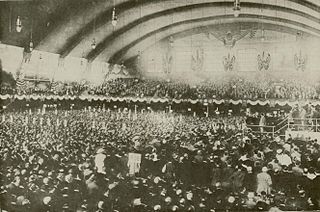
The 1912 Democratic National Convention was held at the Fifth Regiment Armory off North Howard Street in Baltimore from June 25 to July 2, 1912.

A general election was held in the U.S. state of North Dakota on Tuesday, November 2, 2010, with primary elections being held on June 8, 2010.

The 1904 South Dakota gubernatorial election was held on November 8, 1904. Incumbent Republican Governor Charles N. Herreid declined to run for re-election to a third term. Clark County State's Attorney Samuel H. Elrod won the Republican nomination to run as Herreid's successor, and he faced Democratic nominee Louis N. Crill, the former president of the state Senate, and former U.S. Congressman Freeman Knowles, the Socialist nominee. For the first time since 1894, the Democratic and Populist Parties nominated separate candidates. Ultimately, the split in the two parties did not prove dispositive; Elrod defeated Crill and the other candidates in a landslide.
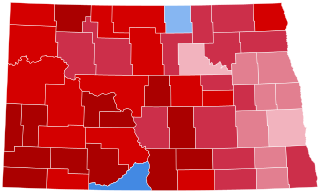
The 2016 United States presidential election in North Dakota was held on Tuesday, November 8, 2016, as part of the 2016 United States presidential election in which all 50 states plus the District of Columbia participated. North Dakota voters chose electors to represent them in the Electoral College via a popular vote, pitting the Republican nominee, businessman Donald Trump, and running mate Indiana Governor Mike Pence against Democratic nominee, former Secretary of State Hillary Clinton, and her running mate Virginia Senator Tim Kaine. North Dakota has three electoral votes in the Electoral College.

The 1926 United States Senate election in North Dakota took place on November 2, 1926. Following his re-election in the special election earlier in the year, Senator Gerald Nye ran for re-election to a full term. Despite spurning the Republican Party's endorsement in the special election, Nye ran in the Republican primary in the regular election. On the same day that he defeated former Governor Louis B. Hanna in the special election—in which Hanna had the Republican nomination and Nye ran as the Nonpartisan League candidate—Nye defeated Hanna in the Republican primary for the regular election. Nye once again faced a crowded general election, but emerged victorious in a landslide, winning nearly 70% of the vote while none of his opponents exceeded 15%.
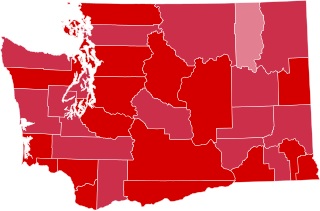
The 1904 United States presidential election in Washington took place on November 8, 1904. All contemporary 45 states were part of the 1904 United States presidential election. Voters chose five electors to the Electoral College, which selected the president and vice president.
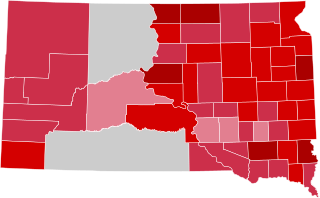
The 1904 United States presidential election in South Dakota took place on November 8, 1904. All contemporary 45 states were part of the 1904 United States presidential election. Voters chose four electors to the Electoral College, which selected the president and vice president.

The 2020 United States presidential election in North Dakota was held on Tuesday, November 3, 2020, as part of the 2020 United States presidential election in which all 50 states plus the District of Columbia participated. North Dakota voters chose electors to represent them in the Electoral College via a popular vote, pitting the Republican nominee, incumbent President Donald J. Trump from Florida, and running mate Vice President Michael R. Pence from Indiana against Democratic nominee, former Vice President Joe Biden from Delaware, and his running mate Senator Kamala Harris of California. North Dakota has three electoral votes in the Electoral College.

The 1944 North Dakota gubernatorial election was held on November 7, 1944. Republican nominee Fred G. Aandahl defeated Democratic nominee William T. DePuy with 52.02% of the vote.

David Bartlett was an American lawyer and politician in the state of North Dakota. He served as the sixth lieutenant governor of North Dakota from 1901 to 1907 under Governors Frank White and Elmore Y. Sarles.

The 1936 North Dakota gubernatorial election was held on November 3, 1936. Nonpartisan League nominee William Langer defeated incumbent Republican Walter Welford with 35.80% of the vote.

The 1930 North Dakota gubernatorial election was held on November 4, 1930. Incumbent Republican George F. Shafer defeated Democratic nominee Pierce Blewett with 73.62% of the vote.

The 1928 North Dakota gubernatorial election was held on November 6, 1928. Republican nominee George F. Shafer defeated Democratic incumbent Walter Maddock with 56.50% of the vote.

The 1904 North Carolina gubernatorial election was held on November 8, 1904. Democratic nominee Robert Broadnax Glenn defeated Republican nominee Charles Joseph Harris with 61.72% of the vote. At the time, Glenn was an attorney and former member of the state Senate, while Harris was a businessman and former member of the United States Industrial Commission.

The 1906 North Dakota gubernatorial election, sometimes called 'The Revolution of 1906' was held on November 6, 1906. This election marked a major shift in North Dakota politics as the incumbent, Republican Elmore Sarles, was defeated by a 53.20% majority vote for Democrat John Burke, who had garnered bipartisan support across the state of constituents tired of Sarles' administration, which was supported by the Republican political machine run by politician Alexander McKenzie.

The 1894 North Dakota gubernatorial election was held on November 6, 1894. Republican nominee Roger Allin defeated People's Party nominee Elmer D. Wallace with 55.76% of the vote.
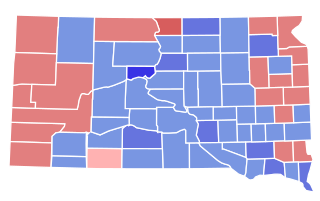
The 1928 South Dakota gubernatorial election was held on November 6, 1928. Incumbent Democratic Governor William J. Bulow ran for re-election to a second term. In the general election, he faced Attorney General Buell F. Jones, the Republican nominee. Despite Republican presidential nominee Herbert Hoover overwhelmingly defeating Democratic nominee Al Smith overwhelmingly in South Dakota, Bulow defeated Jones by a decisive margin to retain the governorship. In so doing, he became the first Democratic candidate for Governor to receive a majority of the vote in the state's history.

The 1904 Illinois lieutenant gubernatorial election was held on November 8, 1904. It saw the election of Republican nominee Lawrence Y. Sherman, who defeated Democratic nominee Thomas F. Ferns and five other candidates.






















